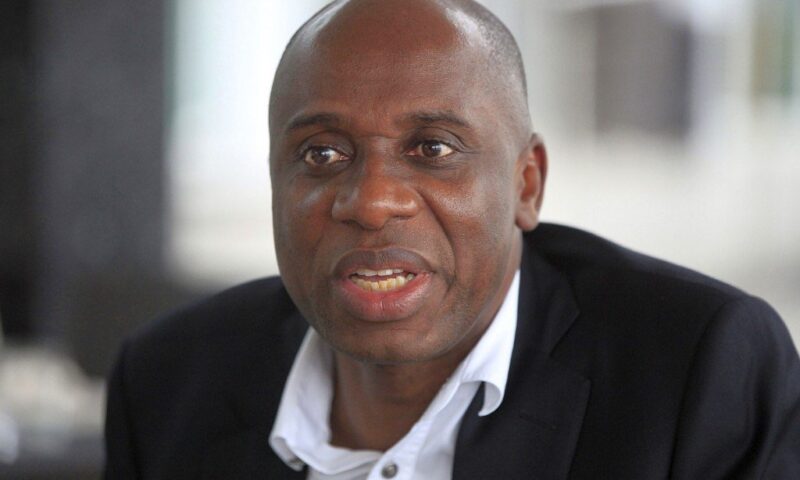Three experts has proper solution to for real sector to attract adequate quantum of private capital from Pension Fund Administrators (PFAs), insurance firms, and foreign investors.
The three of them, the Director General, Lagos Chambers of Commerce and Industry (LCCI) Dr. Muda Yusuf; the Chairman of the occasion, who is also the Chairman. Nigeria Social Insurance Trust Fund, (NSITF), Mr Austin Enajemo-Isire and the Chief Launcher of NAIPCO website, Chairman, Mutual Benefits Assurance Plc, Dr. Akin Ogunbiyi spoke at the 2020 Annual National Conference of the National Association of Insurance and Pension Correspondents (NAIPCO)
They called for business-friendly environment, institutional reforms, better regulation and effective synchronization of fiscal and monetary policies.
Speaking on the theme of the conference, “Promoting Bankable Investments Portfolio for Insurance and Pension Sectors,” Dr Yusuf, stressed the need to de-risk the real sector to boost investor confidence and fund managers’ participation in the real sector.
He said de-risking the real sector will attract more private sector insvestment into the sector, generate more employment opportunities, foster industrialization and economic diversification agenda as well as unlock more investment opportunities in the real sector.
Proffering solution on how to de-risk the real sector, he advocated for policy and institutional reforms, better regulatory environmental and effective synchronization of fiscal and monetary policies.
He said the low yields on government securities ought to have spurred fund managers to explore viable investment opportunities in the real sector, noting that many fund managers are ignoring the real sector due to elevated risk despite quite a number of attractive opportunities.
“Investor’s participation has been weak in the real economy in recent years. About 5% of foreign capital flows to Nigeria went into the real sector between January and June 2020, indicating poor investment sentiment towards the sector. The real sector needs to be totally de-risked to be able to attract adequate quantum of private capital from PFAs, insurance firms, foreign investors,” he advocated.
On investment of pension assets in the real sector, Dr. Yusuf stated that fund managers’ exposure to investment vehicles in the real sector is extremely low due to the high level of risk involved, saying that just 2% of pension assets is invested in real estate, and less than 1% in infrastructure fund.
He said this is because “fund managers often complain that projects in the real economy are non-bankable, hence, the low.”
On Investment Prospects of Nigerian Real Sector, LCCI boss said the Deposit Money Banks (DMBs), just like fund managers, are very cautious in channeling funds to the real economy, particularly this time when risks are elevated in the macroeconomic and business environment.
This, he said, “validates the reason for high borrowing costs on bank facilities to the real economy. Just a few high-profile corporates enjoy lower interest rate (prime rate), while small and medium outfits suffer tight access to funds.”
Major factors dampening the investment prospects of the real sector, Dr Yusuf noted, include vulnerability to external shocks, Foreign Exchange volatility, infrastructure deficit, tough operating environment, regulatory challenges, policy uncertainty, low purchasing power and weak economic growth.
The Chairman of the occasion, who is also the Chairman. Nigeria Social Insurance Trust Fund, (NSITF), Mr Austin Enajemo-Isire, advocated for a deliberate policy by the authorities, in addition to what is currently obtainable, directly or through moral suasion to invest Insurance and Pension Fund in sectors such as Manufacturing, Agriculture and Aviation, etc with an inbuilt safety net.
He said the current restrictive nature of insurance and Pension Funds investment outlets calls for review of the legislations guiding investment of Insurance and Pension Fund, noting that the yelling and plea from the Organised Private sector of Nigeria (OPSN) to create more access to investible funds deserves attention.
Also speaking, Chairman, Mutual Benefits Assurance Plc, Dr. Akin Ogunbiyi, who was the Chief Launcher of NAIPCO website at the occasion, called for government support and patronage for insurance industry.
He said the industry can achieve adequate return on investment and capital adequacy ratio through support and patronage of the Nigerian Insurance industry by government at all levels and also by ensuring reduction of sharp practices to its barest minimum.


